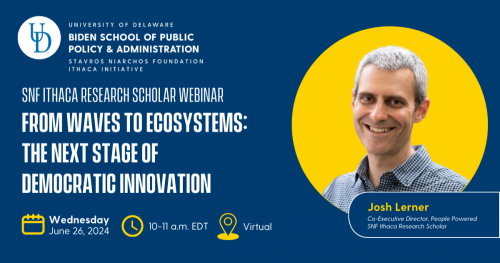
https://www.peoplepowered.org/news-content/josh-white-paper-2024
https://udspace.udel.edu/items/95bf3dbb-9990-483c-9040-197f42060df1
Abstract
The paper responds to the growing challenges facing democracy. Anti-democratic movements are surging around the world, trying to undermine elections and replace them with oligarchy. Pro-democracy movements usually respond by defending elections, but most people think that elections alone are not enough to deliver government by and for the people.
How can we renew democracy and move beyond its current limitations? The white paper offers three main proposals:
-
Expand our understanding of democracy, by revisiting its diverse history. For over 5,000 years, humans have experimented with innovations in democracy. Each wave of innovation has championed a different solution. We generally look at democracy through the lens of the current dominant wave - modern electoral democracy. If we expand our perspective and view the waves alongside each other, we can see a more complete landscape of democratic possibilities.
-
Shift from surfing competing waves to building balanced ecosystems. In the past, most democracy advocates have promoted competing waves of electoral, direct, deliberative, and participatory democracy. A growing sector of the democracy reform movement, however, is shifting its focus to weaving together different practices into balanced ecosystems. The white paper illustrates how this approach is working, in theory and practice.
-
Support a just transition for democracy, by cutting unhealthy habits and adopting new strategies for growth. If we want to save democracy, we need to do more than defend the current system - we need to transition to a better system. The white paper identifies five unhealthy habits that are getting in the way of this transition, and five strategies for growing healthier democratic ecosystems.
On June 26 Josh launched the white paper, in discussion with five global experts on democracy. The recording of the webinar and you can watch to learn more about how the white paper can support your work.
Thank you to the SNF Ithaca Initiative for inviting Josh to serve as a Research Scholar and produce the paper, and to the dozens of peers who helped review and revise the paper!









